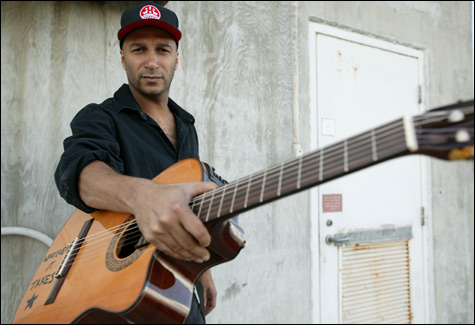
THE NIGHTWATCHMAN is the alter ego Morello invented as he transformed himself into an unplugged, acoustic-strumming frontman. |
It’s an incongruous sight at first: Tom Morello strumming an acoustic guitar emblazoned with the words “Whatever It Takes,” racked harmonica slung around his neck Dylan-style. But even more foreign than the Rage Against the Machine/Audioslave guitar shredder gone wooden is the sight of Morello front and center singing, emitting a deep and sonorous tone somewhere in the range of Johnny Cash or Leonard Cohen.
The idea of Morello as solo folkie would have been unfathomable several years ago. With his bands he’s always been content to plant himself stage left, omnipresent baseball cap in place, grinding out monster riffs and unearthly sounds and leaving the vocal histrionics to others. But the acoustic makeover of this leftist activist during the Bush era makes sense: as an artist who’s unafraid to confront the status quo, Morello as Guthrie-style troubadour is a natural.

He says that transforming himself into an unplugged frontman for One Man Revolution (Epic, April 24) wasn’t easy. He did so by creating an alter ego, the Nightwatchman. “The only guitar I keep at home is a nylon-string acoustic — I wrote all my big rock riffs on it — but I’d never sung solo in my life,” he explains over the phone from Epic’s offices. “I’m not the least bit nervous when rocking an arena with a hard-rock band, but playing to 10 people with mochaccinos was nerve-racking. Pushing through that initial nervousness I really gained a fearlessness in doing this, though, and now you just can’t stop me.”
Morello began appearing as the Nightwatchman in 2004, out of a burning itch to bring to prime time his epic songs of social inequity, corporate gluttony, and abuse of power. He turned up anywhere that would have him during breaks in Audioslave’s touring schedule, “as a way to do this anonymously and not have people come up and bug me and demand that I play [Rage’s] ‘Bulls on Parade’ on acoustic guitar.”
The release of One Man Revolution comes at a crossroads in his career. Audioslave have split: the hard-rock supergroup — formed by Morello with Rage bassist Tim Commerford and drummer Brad Wilk, and Soundgarden’s Chris Cornell in the wake of Rage’s break-up in 2000 — closed up shop when Cornell announced in February that he was leaving to pursue a solo career. Meanwhile, Rage Against the Machine are readying a mini-reunion that as of now will comprise four gigs; with vocalist Zack de la Rocha back in the fold, the band are scheduled to perform April 29 at the Coachella Festival and this summer as part of the Rock the Bells tour. Rage Against the Machine have been away, Morello points out, for virtually the same period of time that Bush has been in office. “It’s time for ‘Here comes the cavalry.’ ”
Morello fans shouldn’t expect to hear anything from the Nightwatchman at the Rage show. His solo compositions weren’t written with a band in mind. They’re meant to be played guerrilla fashion, as he puts it, “in a country-and-western bar or anarchist bicycle shop.” The Nightwatchman, he continues, “is a general looking for an army. But I’m not waiting. If you play with a rock-and-roll band, and we want to do a benefit show, first you have to have a band meeting to decide if you’re gonna do it. Then you have to find a tour manager, get a lighting rig. With this, I just pick up my guitar and I go. There’s a great freedom to it and a great independence to doing this music that I’ve never felt before.”
One Man Revolution’s songs are wordy and topical, but Morello largely avoids polemics or sanctimony. “Flesh Shapes the Day” opens with the declaration that Jesus, Mary, Joseph, and the apostle Paul were black. “It’s about how change happens. People are agents of history, not generals and popes and kings and queens and billionaires. The engine of change is people.”
He draws on his own experiences as an activist in “Union Song,” which he says was written “after being tear-gassed at the FTAA protest in Miami in 2003. I’d go to a lot of rallies, and people were playing songs from the ’60s, or even before that. And I thought, ‘We need songs to motivate and energize and galvanize now.’ ”
And the 9/11-inspired “No One Left”? “The song has the audacity to claim the loss of a loved one is equal, no matter where it happened, and that if you look at people not as objects of fear but rather as brothers, sisters, fathers, mothers, husbands, and wives, then when those people are lost, it reorients your world view.”